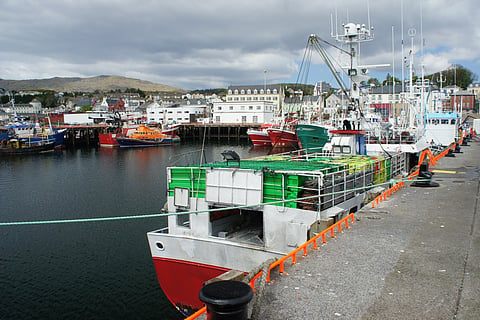

Killybegs in Donegal is one of Ireland's main seafood hubs.
Photo: Adobe Stock.
Ireland’s ocean economy continues to expand, with the latest report from the Marine Institute and the University of Galway’s Socio-Economic Marine Research Unit (SEMRU) revealing significant contributions to the nation’s economy.
The 2024 Ocean Economy Report confirms Irish ocean industries produced a turnover of €6.5 billion in 2023, contributing €2.7 billion in Gross Value Added (GVA) and supporting approximately 39,000 jobs. The report demonstrates strong resilience and growth within Ireland’s marine sectors, crucial to the country's economy and livelihoods, with census data from 2022 showing that over 60% of Ireland’s population - 3.2 million people - live in coastal areas.
Over the five-year period from 2019 to 2023, turnover from ocean-related businesses spanning 13 industrial sectors increased by 20%, GVA rose by 31%, and employment grew by 8%, the report shows.
While overall turnover and GVA saw moderate declines from 2022 to 2023, with sectors such as shipping, sea fisheries, aquaculture, and seafood processing facing challenges, the broader trends indicate adaptability and innovation, in addition to steady recovery from the impacts of the COVID-19 pandemic, the report authors say.
“It is clear from the data and trends that there is a continuing post-pandemic recovery across most sectors. This remains a period of transition for Ireland’s ocean economy as marine industries innovate and respond to new policies and opportunities aimed at addressing the climate and biodiversity crises," said Professor Stephen Hynes, Director of SEMRU at the University of Galway.
Ireland's seafood sector as a whole ranks third in economic contributions, after shipping and maritime transport, and tourism in marine and coastal areas.
The Irish seafood industries, comprising fisheries, aquaculture, seafood processing and seaweed, made a direct turnover of €1.18bn and contributed a gross value added of over €410 million to the Irish economy, directly employing almost 8,000 people.
Within this total, sea fisheries contributed a direct turnover of over €260.5m (GVA €136m), marine aquaculture €168.2m (GVA €49m), seafood processing €613.9m (GVA €171.7m), and seaweed, marine biotechnology and bioproducts together accounted for almost €137.6m (GVA €53.6m).
However, the indirect economic contributions of the Irish seafood sector were much higher, estimated to stand at a turnover of 2.43bn in 2023, with 743m in gross value added, and providing employment for 14,608 people.
“This report not only highlights the impressive economic contributions of Ireland’s marine industries but also underscores their strategic importance in shaping a sustainable future for our country," said Dr Rick Officer, CEO of the Marine Institute.
"Capturing detailed insights and trends including measuring the economic value of our marine industries is an important element of our work in supporting Government with the best available evidence to inform policy," he added.
The comprehensive analysis, which has been published annually since 2010, tracks Ireland’s ocean economy using indicators such as turnover, GVA, and employment. The report also includes a decade-long comparison of trends, offering a detailed perspective on the sector’s growth.
"This collaboration, supported by the Central Statistics Office (CSO) and Bord Iascaigh Mhara (BIM), provides a robust analytical framework to inform marine and maritime planning and deliver equitable and sustainable ocean and coastal economies," Officer said.
For 2024, the report is supplemented by an interactive data dashboard, providing stakeholders with enhanced tools to analyze and understand the sector’s performance.
The full report, Ireland’s Ocean Economy, 2024, is available on the Marine Institute’s website, alongside the new interactive dashboard.
